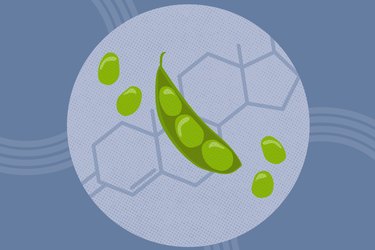
From tofu and tempeh to milk and miso, the seemingly simple soybean can be molded into just about anything. But despite its versatility, nutritiousness and deliciousness, soy is still a pretty contentious food.
Soy contains phytoestrogens — a group of natural compounds that can act like the hormone estrogen — which has led to some concerns that eating or drinking the plant-based protein disrupts our natural hormones. But does it really? And if so, does that mean we need to avoid soy altogether, or just limit how much we eat?
Video of the Day
Video of the Day
For our Ask the RDs series, we asked readers to send us their biggest nutrition questions and then posed the 12 most common to a panel of registered dietitians. Many readers wanted to know whether or not soy really affects hormones and if they should be worried. Here's what the experts had to say.
Are the Phytoestrogens in Soy Bad for You?
"There's a lot of controversy around whether soy messes with hormones. I think there's a lot of confusion about this because soy contains phytoestrogen, a sort of plant version of estrogen, which we know is a hormone in the body.
So, would large amounts of soy cause higher estrogen levels? Technically, the research points to yes. But it's not something that would necessarily be harmful for everyone.
It's one of those situations where you should chat with your doctor if you're going to be eating a lot of soy-based products. There's enough research to support that it's still safe enough to eat, but it all depends on the person and how different people process and metabolize soy."
"I always operate from the premise that there is no 'one size fits all.' When we're talking about a food, I think it's important not to just use blanket statements.
Soy can be, for example, edamame or tofu. But it can also be in the form of a texturized vegetable protein that's more on the processed side. Or it can be in something that has been ground down and added to a chip or a bar. All those food products contain soy, but there's a difference in how the body reacts.
When we're talking about hormones, that's a blanket term as well, right? Do we mean hunger and satiety hormones? Do we mean how the body responds to insulin if the soy is packaged with a refined grain? Then, yes, probably there could be an undesired outcome. But having whole tofu a couple of times a week for the well person should be fine.
In general, when choosing your soy, I recommend organic and minimally processed versions."
"With the research out there, there's just not enough evidence that soy can increase hormones or cause harm.
I would definitely keep a variety of soy milk and regular milk in your diet, though, just to get a variety of nutrients. Don't rely too heavily on one source. Some of the best sources of soy include edamame, soy milk, tofu and tempeh."
The Takeaway
Soy contains phytoestrogens, which are plant compounds that can mimic the estrogen hormone found in humans. It's generally safe to eat in moderate amounts for the average person, especially if you prioritize healthy, less-processed sources like edamame, tofu or soy milk. If you're concerned about soy affecting your hormones because of a specific medical condition or other issue, talk to your doctor.
Confused about nutrition? Get answers to more common questions in our Ask the RDs series.


